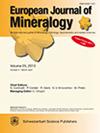挪威西部片麻岩地区超高压蚀变岩的逆冲作用
IF 1.7
3区 地球科学
Q2 MINERALOGY
引用次数: 0
摘要
摘要。挪威西部的西部片麻岩区(WGR)出露了超高压(UHP)蚀变岩,这些蚀变岩重复出现在高压(HP)蚀变岩区域内,没有证据表明它们被构造剪切或韧性流动结构分隔开来。我们研究了来自北部两个超高压地区和相邻高压地区的 10 个斜长岩,以评估这种模式的意义。含正长石样品中的正长石的Al2O3含量较低(0.17 wt %-0.37 wt %),但其晶界不受部分重结晶或置换的影响。根据共存矿物相之间的元素分区进行的经典地热测算表明,HP 和 UHP 地区的样品都处于金刚石稳定场内的变质条件下。在相关的不含正长辉石的斜长岩中,原生clinopyxene含有针状石英±副长辉石或片状白云石的排列包裹体,而次生(交辉)clinopyxene中没有这些包裹体。利用扫描电子束或图像处理技术从晶粒横截面表面获得的原生霞石的重建矿物成分是非共计量的,与含包裹体的主霞石相比,它们具有较高的钙-Eskola成分和较低的钙-Tschermak成分。这些内含物的摩尔比率与原生霞石中的针状物一致,它们是由含空位的前生霞石在早期夕闪岩-成因逆演过程中通过外溶解反应 2 Ca-Eskola = Ca-Tschermak + 3 石英形成的。进一步的逆退将针状石英部分转化为霰石内部的不规则形状的白云石,并将两代霰石部分转化为闪石,偶尔保留针状石英。超高压地区和高纯度地区斜长岩的最大变质条件和矿物解理微结构都很相似,这表明在金刚石的稳定场内有共同的变质历史,但在逆冲过程中发生了分化。因此,WGR中的UHP和HP区域的交替可能是由于逆退效率的空间变化过程而形成的,例如应变(重结晶)或流体流动(扩散)的局部化或两者兼而有之,而不是UHP和HP单元的构造堆积。目前,从东北到西南的整个沿岸地段都发现了 WGR 地壳岩石超高压变质作用的证据,这些地段涵盖了以前确认的超高压和相邻地区。本文章由计算机程序翻译,如有差异,请以英文原文为准。
Retrogression of ultrahigh-pressure eclogite, Western Gneiss Region, Norway
Abstract. The Western Gneiss Region (WGR) in western Norway exposes ultrahigh-pressure (UHP) eclogites that occur repeatedly, within an area of high-pressure (HP) eclogites, without evidence of being separated by tectonic shear or ductile flow structures. We studied 10 eclogites from two northern UHP areas and the interjacent HP area to evaluate the significance of this pattern. The orthopyroxene in orthopyroxene-bearing samples has low Al2O3 contents (0.17 wt %–0.37 wt %), provided its grain boundaries were unaffected by partial recrystallisation or replacement. Classical geothermobarometry based on element partitioning between coexisting mineral phases suggests metamorphic conditions within the diamond stability field for the samples from both the HP and UHP areas. The primary clinopyroxene in the associated orthopyroxene-free eclogites contains aligned inclusions of either needle-shaped quartz ± pargasite or lamellar albite, which are absent from the secondary (symplectic) clinopyroxene. Reconstructed mineral compositions of the primary clinopyroxene obtained from grain cross-section surfaces using a scanning electron beam or image processing are non-stoichiometric, and they have higher Ca-Eskola and lower Ca-Tschermak components than the inclusion-bearing host clinopyroxene. The molar ratios of these endmembers are consistent with the needles in the primary clinopyroxene being formed from vacancy-bearing precursor clinopyroxene by the exsolution reaction 2 Ca-Eskola = Ca-Tschermak + 3 quartz during early eclogite-facies retrogression. Further retrogression partially transformed the needle-shaped quartz to irregularly shaped albite within the clinopyroxene and partially transformed both clinopyroxene generations to amphibole that occasionally preserves the needles. The similarity of both the maximum metamorphic conditions and the mineral exsolution microstructures in the eclogites from UHP and HP areas indicates a shared metamorphic history within the stability field of diamond, but a history that diverged during retrogression. Consequently, the alternations of UHP and HP areas in the WGR may have formed by a process that allowed for spatial variations in retrogression efficiency, such as the localisation of strain (recrystallisation) or fluid flow (diffusion) or both, rather than by tectonic stacking of UHP and HP units. Evidence for the UHP metamorphism of WGR crustal rocks is now found from NE to SW along the entire coastal section that covers previously recognised UHP and interjacent areas.
求助全文
通过发布文献求助,成功后即可免费获取论文全文。
去求助
来源期刊
CiteScore
2.80
自引率
9.50%
发文量
40
审稿时长
6-12 weeks
期刊介绍:
EJM was founded to reach a large audience on an international scale and also for achieving closer cooperation of European countries in the publication of scientific results. The founding societies have set themselves the task of publishing a journal of the highest standard open to all scientists performing mineralogical research in the widest sense of the term, all over the world. Contributions will therefore be published primarily in English.
EJM publishes original papers, review articles and letters dealing with the mineralogical sciences s.l., primarily mineralogy, petrology, geochemistry, crystallography and ore deposits, but also biomineralogy, environmental, applied and technical mineralogy. Nevertheless, papers in any related field, including cultural heritage, will be considered.

 求助内容:
求助内容: 应助结果提醒方式:
应助结果提醒方式:


